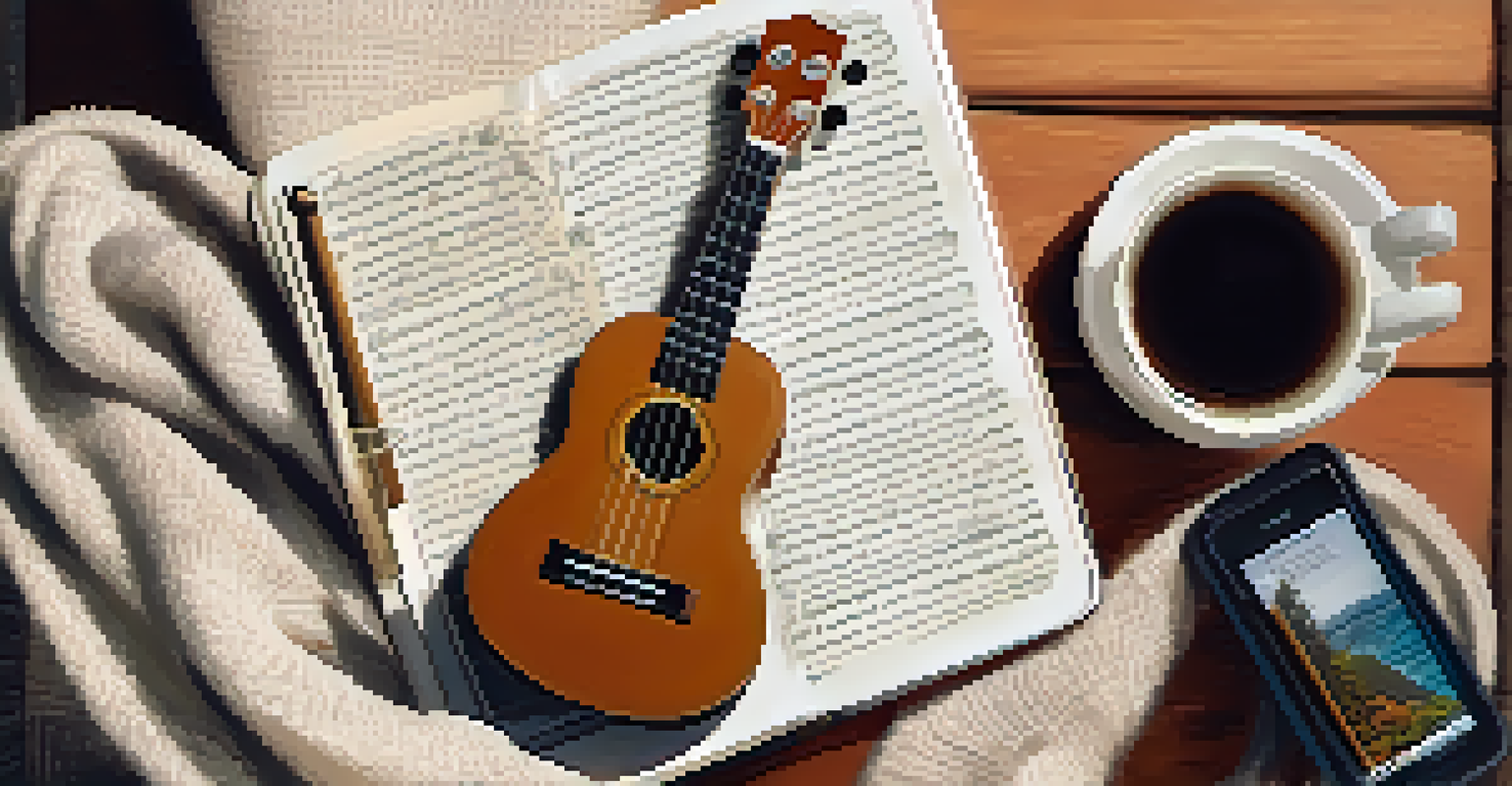Using the Ukulele to Write Catchy Hooks and Melodies

Why the Ukulele is Perfect for Catchy Hooks
The ukulele, with its bright and cheerful sound, is an ideal instrument for crafting catchy hooks. Its simplicity allows songwriters to focus on melody rather than technical complexity. This makes it accessible for beginners and seasoned musicians alike, providing a fun and engaging way to express creativity.
Music can change the world because it can change people.
When you strum the ukulele, its light, bouncy tone can instantly lift your mood. This uplifting vibe can inspire hooks that resonate with listeners, making them want to sing along. Think of it as the musical equivalent of sunshine—inviting and warm, drawing people in with every strum.
Additionally, the ukulele's four strings mean fewer notes to manage, allowing for quick experimentation. This encourages a more playful approach to songwriting, where catchy hooks can emerge unexpectedly during free-flowing jam sessions.
Basic Chords to Get You Started
Before you can write memorable hooks, you'll want to familiarize yourself with some basic ukulele chords. The C, G, Am, and F chords form the backbone of countless popular songs. By mastering these chords, you’ll open up a world of possibilities for creating your own catchy melodies.

For instance, the chord progression C-G-Am-F is used in many hit songs, demonstrating how effective simple chords can be. Experimenting with different strumming patterns can help you discover variations that feel unique and engaging. As you play, pay attention to how your mood shifts with each chord change, sparking new ideas.
Ukulele's Charm for Catchy Hooks
The ukulele's bright sound and simplicity make it perfect for creating catchy melodies that resonate with listeners.
Don’t be afraid to mix things up! Try playing these chords in various orders or adding embellishments like hammer-ons and pull-offs. This experimentation can lead to surprising and catchy hooks that might just become the heart of your song.
Finding Inspiration for Your Hooks
Inspiration can strike at any moment, but sometimes it helps to have a few techniques on hand. Start by listening to songs you love and analyze their hooks—what makes them stick in your head? By dissecting these catchy elements, you can learn to craft your own unique melodies on the ukulele.
The only thing better than singing is more singing.
Another great way to spark creativity is to write down phrases or ideas that resonate with you. Whether it’s a line from a book, a conversation overheard at a café, or a vivid memory, these snippets can serve as the foundation for your lyrics. Pairing these thoughts with your ukulele's sound can lead to truly memorable hooks.
Finally, don’t underestimate the power of nature or your surroundings. Take your ukulele outside and let the beauty of the world inspire you. The fresh air and natural sounds can help clear your mind and ignite your creativity, leading to catchy melodies that capture the essence of your experiences.
The Role of Rhythm in Creating Hooks
Rhythm plays a crucial role in making melodies catchy. The ukulele’s light, percussive quality allows you to experiment with different rhythmic patterns. Whether you favor a steady strum or a syncopated rhythm, these variations can add a layer of interest to your hooks.
Think of rhythm as the heartbeat of your song. Just like a good story needs a compelling pace, your melody thrives on rhythmic variety. Play around with slowing down or speeding up certain phrases to find what feels right, and don’t hesitate to mix in some pauses or rests for dramatic effect.
Basic Chords Open Creative Doors
Mastering essential ukulele chords like C, G, Am, and F allows songwriters to explore endless catchy melodies.
Experimenting with different tempos can also lead to exciting discoveries. A hook that feels catchy at one speed might transform into something entirely different when played faster or slower. This flexibility invites you to explore various styles and genres, enriching your songwriting toolkit.
Using Lyrics to Enhance Your Melodies
Once you have a catchy hook, adding lyrics can elevate your melody to a whole new level. Think about the emotions you want to convey and how the words can complement the music. A well-crafted lyric can make the difference between a good hook and a great one.
Consider using imagery and relatable themes in your lyrics. For instance, if your melody feels playful, writing about light-hearted topics can enhance that vibe. The connection between your melody and lyrics can create an engaging experience for your listeners, making them feel more connected to your song.
Don’t shy away from revising your lyrics as you develop your melody. Sometimes, the best lines emerge after several iterations. Keep experimenting until the words flow naturally with the music, ensuring that your catchy hook resonates with your audience.
Recording and Sharing Your Melodies
Once you’ve crafted your catchy hook and melody, it’s time to share your creation with the world. Recording doesn’t have to be complicated; even a simple smartphone recording can capture the essence of your song. This allows you to preserve your ideas and share them with friends or social media followers.
Consider using free or affordable recording software to enhance your sound. Layering different ukulele parts or adding vocals can give your melody more depth. These elements can help your song stand out and showcase your unique style, drawing in more listeners.
Inspiration Can Strike Anywhere
Listening to music, jotting down ideas, and connecting with nature can spark creativity and lead to memorable hooks.
Sharing your music online can lead to valuable feedback and connection with other musicians. Platforms like SoundCloud or YouTube provide great avenues for exposure. Engaging with your audience can inspire further creativity and provide opportunities for collaboration.
Tips for Overcoming Writer’s Block
Every songwriter faces writer’s block at some point, but the ukulele can be a powerful tool to break through it. When you’re feeling stuck, try playing random chords and see where the music takes you. This spontaneous approach can often lead to unexpected melodies and hooks that reignite your creativity.
Another effective strategy is to change your environment. Sometimes, a fresh perspective is all you need. Take your ukulele outside, visit a new café, or simply rearrange your workspace. New surroundings can provide fresh inspiration and help you see your songwriting from a different angle.

Finally, remember that it’s okay to take a break. Stepping away from your project can help clear your mind and reduce pressure. When you return, you might find that the ideas flow more freely, allowing you to create catchy hooks and melodies that you love.